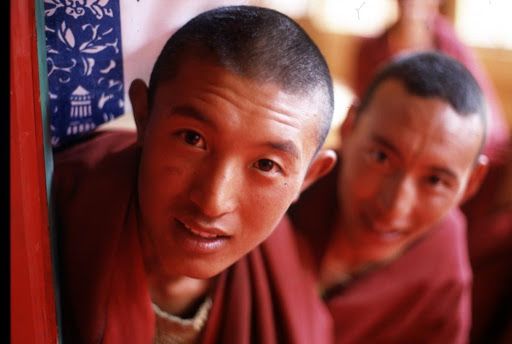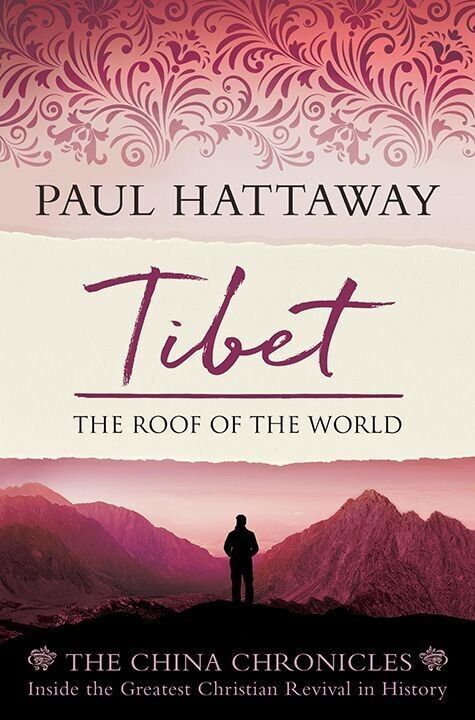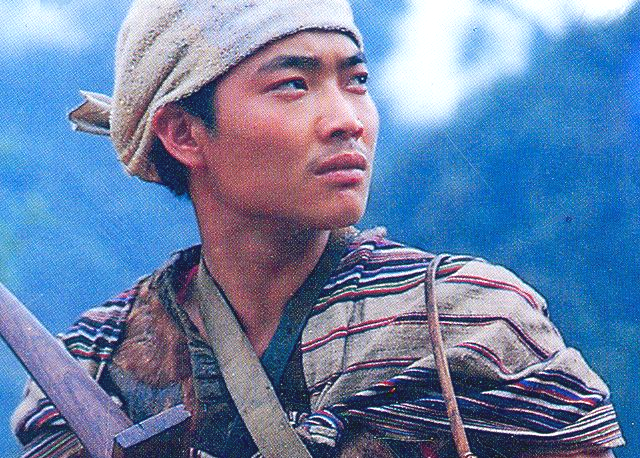Tenzin Lahkpa
The Tibetan Monk who met Jesus
In 2019, the dramatic and well-written testimony of a Tibetan monk was published, giving rare insights into the dark state of life in Buddhist monasteries. The book also illuminates the huge challenges Tibetans face once they profess faith in Jesus Christ.
Tenzin Lahkpa was born in a village in the mountains of Amdo. His parents proudly named him after the Fourteenth Dalai Lama, Tenzin Gyatso, who hails from the same area. When he was 15, his mother took him to the local monastery to commence a lifetime of Buddhist study and service. She told her tear-filled son:
"From the moment you were born, I knew that you would be the one to honor our family and become a monk. I have dreamed about this day since you were very little. You were always so smart and kind. You were always so clever, and I knew that your purpose was to be a monk. I know that this is not easy for you to understand, but you were born to be a monk and lead our people into enlightenment."
In the monastery, Tenzin's life was miserable. It was like a huge, dark prison cell that he felt he would never be able to escape. In the mornings he joined the other monks begging for food on the streets, and after returning to the monastery each day they were abused verbally, physically, and sexually.
According to Tenzin, some of the older monks and lamas were rampant homosexuals and pedophiles who didn't think twice about using small children to satisfy their wicked cravings. He also grew disillusioned when he discovered that many of the senior lamas, who are supposed to be celibate, had secret wives and families away from the monastery.
One day, Tenzin witnessed the senior lama severely beating a young boy. When he asked what the boy had done, the other monks cautioned him to be quiet, and whispered that the boy was the lama's dakini―a term used to describe someone who is used for sexual pleasure. On many nights, Tenzin was unable to sleep as he heard the muffled screams of anguished young boys in other parts of the monastery.
Tenzin longed to escape, but he knew he would never be allowed to go free. For more than 20 years he remained enslaved in monastic life, and despite moving to Lhasa and then to Dharamsala, India―where he met the Dalai Lama several times―inner peace remained elusive.
While he was in northern India, Tenzin was visited by a relative who was a former monk. He was shocked when this man explained that he had moved to America and had become a Christian. Tenzin had never heard that word before, and when he was told it was the name used to describe followers of Jesus, Tenzin recoiled in horror, for all monks had been taught never to utter that Name. It had been drilled into them that the Name of Jesus was so dangerous that it had the power to overturn the very fabric of Tibetan life, and Buddhism itself.
Once, when he had discreetly asked a visiting monk about Jesus, Tenzin was sternly warned:
"Jesus and His followers destroy the entire order of all that we know.... The underworld do not trifle with Jesus. We should not even be discussing Him. Talking about Him gives Him power. He disrupts the entire order of all that we know, because He can overpower the underworld and the gods that lead us to enlightenment....
You don't prevent the spread of a virus by bringing it to your home and evaluating it. You keep it as far from you and your family as possible. And you don't bring Jesus into your temple to evaluate His dangers! You keep His Name as far from your students as possible. You lock him out.
Unlike other gods, Jesus is given power by sharing about Him. He is like a deadly virus―by the time you realize how deadly He is, He has already infected everyone in your home."
For the next few years, Tenzin's interest in learning more about Jesus grew, but he was frustrated in his attempts to satisfy his curiosity. One day a letter arrived from his mother, asking him to return home because his father had died. Tenzin was heartbroken, and made the long overland journey back to Tibet. Not having a passport, he made it only as far as the Nepal-China border where he was arrested, bound, and taken by road to Lhasa. There, he was severely beaten by Communist officers and imprisoned for six months.
After contracting tuberculosis, Tenzin was admitted to hospital, where an Amdo Tibetan-speaking Swedish doctor treated him. The physician wore a small cross on his collar, and when Tenzin asked what it meant, he was told that it meant he was a follower of Jesus Christ.
Tenzin was excited to meet a believer in Jesus, and his mind filled with many questions that he wanted to ask. The doctor gave him some Christian literature, in both Tibetan and Chinese, and asked him to study it.
One day, the doctor asked if he could pray for Tenzin's healing, for his condition had deteriorated and he needed more than medicine to survive. Tenzin agreed, and later described what happened:
"The doctor walked closer to my bed, put his right hand on my right arm, and began speaking in a language I was not familiar with. Suddenly, without warning, I felt something flow through my arm. It was like a warm, soft blanket. It moved into my shoulders and chest, and then throughout my entire body.
I could not understand the doctor's words, but his prayer had something my prayers lacked―it had power."
That moment was a turning point in Tenzin Lahkpa's life. He had come face to face with the reality of Christ's power, and that night as he fell asleep he had a dramatic, life-changing dream. He recalled:
"A man in a white robe came to me in my dreams. He had a glow about Him that radiated in every direction. I felt warm and safe in His presence.
As He approached me, I could tell there was something wrong with His hands. In His palms were scars that had not completely healed over. I tried to look closer to see if I could catch a glimpse of His face, but I could not.
'Follow Me,' He said. He spoke perfect Tibetan and had a low, soothing voice like that of a loving father.
'Are you Jesus?' I asked.
But again, He simply said, 'Follow Me.'
'Are you the one to show the path to truth?'
'Follow Me, Tenzin. I am the Path. I am the Way. I am the Truth. No one comes to the Path but through Me.'
'OK,' I answered. 'I will follow You.'"
For weeks, Tenzin remained in hospital, using every spare moment to study the Bible. The doctors and nurses were amazed at his recovery, but Tenzin knew it was because of the healing prayer by the Swedish doctor.
Awed by everything he had learned, Tenzin realized that a time was coming when he would have to leave the monastery. His journey to find the truth was taking him on a radically different path.
After returning home, Tenzin was burdened to share what he had learned with his friends at the monastery. He called a special gathering of the monks, and requested a public debate with the head lama, Tashi Lama.
Despite knowing that the monks would react furiously the moment he mentioned Jesus, Tenzin felt a supernatural peace inside. God was with him and had promised never to leave or forsake him. Even if he was killed, he knew he would be with his Lord and Master in paradise. There was no reason to fear.
Hundreds of monks crammed into the monastery courtyard to witness the debate. Rumors swirled about the reason for the special meeting, with some assuming that Tenzin planned to challenge the lama's leadership in a bid to replace him.
After struggling to find the right words, Tenzin Lahkpa took a deep breath and boldly declared:
"What if I told you that I prayed to a God who said that He could guide me through the spirit world, and I did not have to earn merits to hear from Him because He gave it all to me by grace? I could not earn it on my own....
When I was lying in bed in the hospital, I was told about a God who gave His life for me so that I would not have to suffer any longer. He did not do it because I had earned enough merits. He did it because He loved me. His love leads to the path that ends suffering, and His Name is Jesus."
An enraged Tashi Lama screamed, "Grab him now!" and dozens of monks rushed at Tenzin, hissing, "He's a Christian! Kill him!"
The new believer was choked and savagely beaten to a pulp, and his battered and unconscious body was left to die. Even his own brother, who had also become a monk, was forced to beat him. Tenzin's mother suffered for her son's actions, and her house was burned to the ground.
The badly injured disciple of Christ recalled his thoughts as he was being beaten:
"I knew that I must die to myself so that I could live in Christ. And if I could live in Christ, then, although they would kill my body, I would live again with Him also. In that moment, I no longer feared death.
Although I was on the ground being kicked and punched by everyone, I was not their prisoner. I was being beaten as a free man. I had more hope in that moment than all of the other men there. I was no longer a prisoner of Buddha. They were. I was being beaten for leaving Buddha, and they were beating me because they were too afraid to."
Hours later, after darkness had fallen, the blood-splattered Tenzin regained consciousness, and he heard a soothing voice say, "Follow Me, My child." A supernatural peace flooded his soul, and moments later a person's hand was clamped firmly over his mouth. His brother had returned to help him escape in the night.
Tenzin was put on a bus to a faraway city, where he took months to recover from his injuries. He was warned never to return to his home area or he would be killed.
For most of Tenzin's life his identity had been chosen for him. His head was shaved and his clothes were the same as all the other monks, to strip him of individualism and identity. He couldn't think for himself or act independently of the monastery.
He was now free, but everything had been changed in his life, and it would take a long time to adjust. Despite having no money, bank account, or any connections in this world, he walked away from his former oppressive way of life and walked towards Jesus Christ, the light of the world.
In his new location, Tenzin was eventually contacted by some Christians who warmly embraced him and explained that he had a unique and precious God-given identity that made him different from everyone else in the world. For a long time he had a strong battle in his mind as everything he had learned was challenged and turned upside down.
Meanwhile, the monks back at the monastery remained furious with Tenzin. In their minds he had dishonored his nation, family, and culture. They tracked down where he was staying and tried everything to get him to recant and return to the monastery. When their pleas fell on deaf ears they decided it was better for him to be dead than to walk away, and several attempts were made on his life.
Later, Tenzin began working with a medical charity in west China, giving him the opportunity to witness to many sick Tibetans who visited the hospital for treatment. One visitor was a Tibetan lady named Mapu. Tenzin shared the gospel with her and she believed, becoming the first Tibetans he baptized. Mapu loved him and they were united in marriage. For 20 years he had scarcely seen a woman and had been completely cut off from all contact with the opposite sex, so marriage was another shocking change in his life.
Tenzin and Mapu now have two sons, and he often says the most wonderful gifts God has given him, apart from salvation, are his wife and children.
Never one to lack courage, in 2017 Tenzin heard that a bacterial infection had broken out in his home area. Many people, including his beloved mother, had died as the epidemic swept through. Despite the threat to murder him if he ever showed his face there again, Tenzin was compelled by the love of God to return to the very monastery where he had almost been beaten to death years earlier. He reasoned:
"I knew that most of them wanted to kill me because they felt I had betrayed them. However, I could not sleep knowing that God had given us the means to save them. I had to do something with what God had placed in my hands. I knew that because Jesus loved them, I needed to love them as well―even if they hated me. I wanted to be there to serve them and show them the love of Jesus, and I would do so―even if they killed me."
Tenzin led a medical team to his home town, and provided treatment to more than a thousand people. The locals were hesitant to receive help from him, but so great was their distress that they put aside their prejudices and accepted the assistance.
One day, Tenzin was sitting in the clinic when Tashi Lama walked in. Tenzin immediately grabbed a chair for him to sit on, and bowed low to honor his former persecutor. Tashi Lama's eyes grew large as he realized he was being served by the man he had tried to murder.
The next day, all the leading monks gathered as Tenzin presented a plan to build the first permanent health clinic in the town.
Tenzin Lahkpa—who was dedicated to Buddha at a young age and who served many years as a monk—is now a jewel in the crown of Jesus Christ, and an example of God's ability to transform lives radically from the inside out.
Many years ago, Tenzin's mother had predicted that he would lead their people into enlightenment. He is doing just that. He continues to serve the Living God, and he leads a small Tibetan house fellowship.
With living examples like Tenzin Lahkpa displaying the amazing transformative power of Jesus Christ to liberate people, it's no wonder the lamas of Tibet and the demonic world fear His matchless Name, and why they shudder at the thought that the 'Jesus virus' might one day spread throughout the Tibetan world.
© This article is an extract from Paul Hattaway's book ‘Tibet: The Roof of the World’. You can order this or any of The China Chronicles books and e-books from our online bookstore.
1. Tenzin Lahkpa with Eugene Bach, Leaving Buddha: A Tibetan Monk's Encounter with the Living God (New Kensington, PA: Whittaker House, 2019).
2. Lahkpa with Bach, Leaving Buddha, pp. 52-33.
3. Lahkpa with Bach, Leaving Buddha, pp. 150-51.
4. Lahkpa with Bach, Leaving Buddha, p. 179..
5. Lakhpa with Bach, Leaving Buddha, p. 179.
6. Lakhpa with Bach, Leaving Buddha, p. 192.
7. Lakhpa with Bach, Leaving Buddha, p. 196.
8. Lakhpa with Bach, Leaving Buddha, p. 203.






